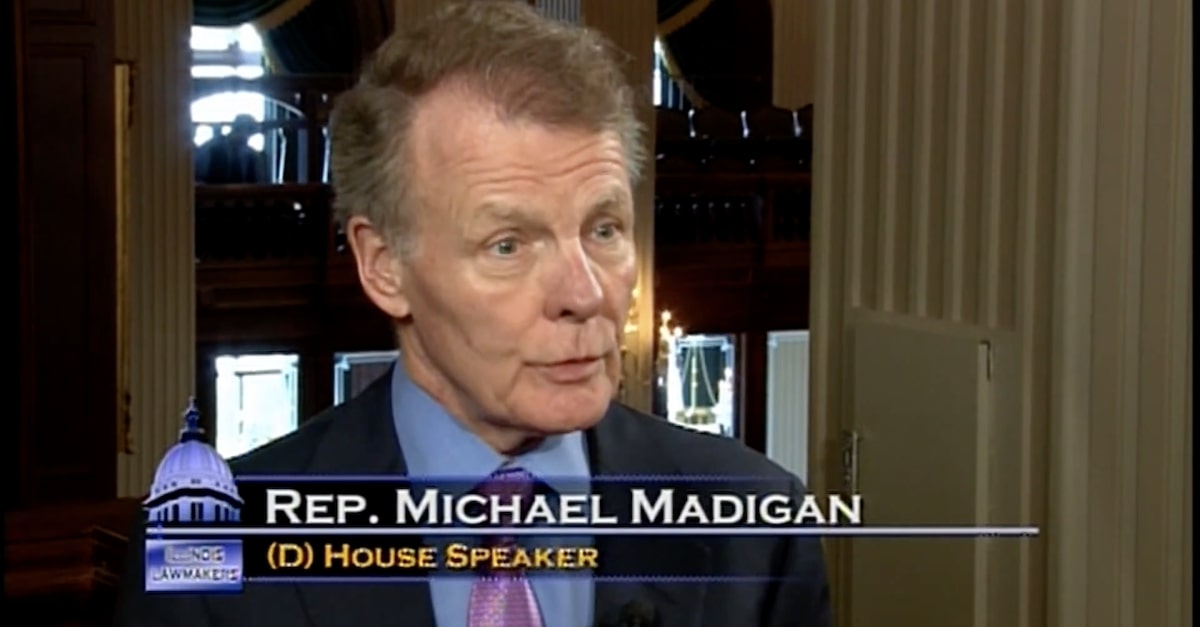
Ex-Indiana state Rep. Michael Madigan (Screengrab via YouTube)
Federal prosecutors charged the former president of AT&T Illinois with conspiring to unlawfully influence the ex-chair of the Prairie State’s Democratic Party and ex-Assembly Speaker Michael Madigan, who himself is facing a battery of corruption allegations earlier this year.
The disgraced executive, Paul La Schiazza, stands accused of one count of conspiracy, one count of corruptly giving something of value to reward a public official, and three counts of using a facility in interstate commerce to promote unlawful activity.
Madigan served in the Illinois House of Representatives starting in 1971 and led it as Speaker between 1997 and 2021, when his tenure as a state lawmaker ended.
The conspiracy also allegedly involved Michael F. McClain, who served with Madigan in the House of Representatives for roughly a decade beginning in 1972. McClain, an attorney whose practice began around 1977, served as a lobbyist and consultant after his tenure as a lawmaker.
It is in that capacity that prosecutors say La Schiazza, 65, used McClain, 75, to influence Madigan, 80. All three are now being prosecuted in federal court.
“On or about February 16, 2017, La Schiazza informed AT&T Illinois employees that McClain had been assigned by Madigan to work on AT&T Illinois’s legislation as a ‘Special Project,'” the indictment states.
Prosecutors say that the conspiracy involved a third person whose name is shielded in court papers as “Individual FR-1.”
With these three allies, prosecutors say, AT&T Illinois hoped for a breakthrough in a long-attempted but unrealized legislative ambition.
“Between in or around 2010 and continuing until in or around 2015, AT&T Illinois unsuccessfully worked to enact legislation in the Illinois General Assembly that would have made it easier to terminate its obligation to provide landline telephone services to all Illinois residents, which was commonly referred to as the carrier of last resort (‘COLR’) obligation,” the indictment states. “AT&T Illinois projected that it would save millions of dollars through the passage of COLR legislation and the elimination of its obligation to provide landline services to all Illinois residents.”
This, prosecutors say, was the so-called “Special Project.”
According to the indictment, the unidentified individual was an intermediary for corrupt payments.
“It was part of the conspiracy that, for the purpose of influencing and rewarding Madigan in connection with his official duties as Speaker of the House of Representatives, and to assist AT&T Illinois with respect to the passage of COLR legislation, the conspirators arranged for Individual FR-1 to indirectly receive payments made at the direction of AT&T Illinois totaling $22,500, even though Individual FR-1 did no work in return for such payments, and created and caused the creation of a false contract and other false internal records to disguise the true nature of these payments,” the indictment states.
Prosecutors claim that the influence scheme led to the passage of the bill.
“The General Assembly passed AT&T Illinois’s COLR legislation, contained in Senate Bill 1839, on or about May 31, 2017, but it was vetoed by the Governor of Illinois,” the indictment states. “Another version of the COLR legislation, contained in House Bill 1811, was passed by the General Assembly, and it was vetoed by the Governor again. The veto was overridden in the House and Senate on or about July 1, 2017, and the COLR legislation became law. Madigan voted in favor of House Bill 1811, and voted to override the Governor’s veto of House Bill 1811.”
The indictment was unsealed on Friday in the U.S. District Court in Chicago.
Read La Schiazza’s indictment here.